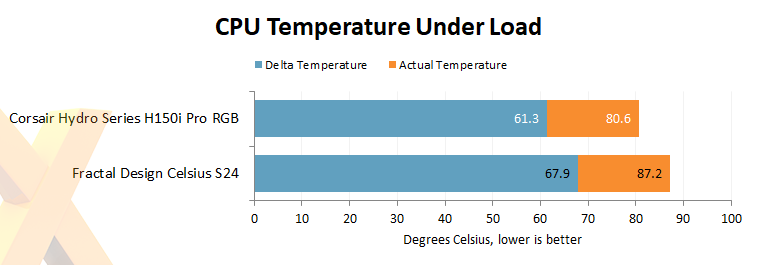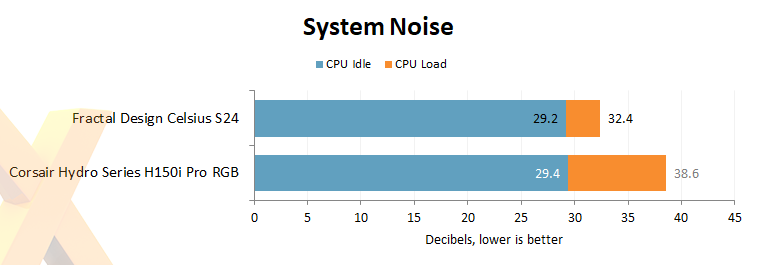Test Methodology and Performance
Comparison Coolers |
|||||
|---|---|---|---|---|---|
| Category | Model | HEXUS Review | Reviewed Price | Warranty | Product Page |
| Liquid | Corsair Hydro Series H150i Pro RGB | January 2018 | £165 | 5 Years | corsair.com |
| Fractal Design Celsius S24 | May 2017 | £105 | 5 Years | fractaldesign.com | |
HEXUS CPU Cooler Test Bench |
||
|---|---|---|
| Hardware Components | Product Page | |
| Processor | Intel Core i7-8700K (overclocked to 4.8GHz) | intel.com |
| Motherboard | Asus ROG Maximus X Hero | asus.com |
| Graphics Card | MSI GeForce GTX 1080 Ti Gaming X Trio | msi.com |
| Memory | G.Skill Trident Z 32GB (2x16GB) DDR4-3200 | gskill.com |
| Power Supply | be quiet! Dark Power Pro 11 1,000W | bequiet.com |
| Primary Storage | 256GB WD Black PCIe SSD | wdc.com |
| Secondary Storage | 1TB Crucial MX300 SATA SSD | crucial.com |
| Chassis | be quiet! Dark Base 700 | bequiet.com |
| Monitor | iiyama ProLite X4071UHSU-B1 | iiyama.com |
| Operating system | Windows 10 Pro | microsoft.com |
Benchmark Process
Our test platform has been refreshed for 2018 and now includes a hexa-core Intel Core i7-8700K processor overclocked using 1.225v to 4.8GHz across all cores. The 12-thread chip is paired to 32GB of dual-channel G.Skill Trident Z DDR4 memory set to run at 3,200MHz using the built-in XMP profile.
To get a feel for how the coolers compare, CPU temperature is logged while a large 4K video clip is encoded in multiple passes using the freeware HandBrake utility. The workload tasks all available threads for a prolonged period and, in order to provide a stabilised reading, we then calculate the average temperature across all cores from the last five minutes of encoding.
Actual CPU temperature is recorded and we also graph the delta temperature - that's CPU temperature minus ambient temperature. Last but not least, to give you an idea of cooler acoustics, we use a PCE-318 noise meter to measure overall system noise in both idle and load states.
Notes
Our be quiet! Dark Base 700 chassis is set to run with its two stock SilentWings 3 PWM fans - a 140mm front intake and a 140mm rear exhaust - both of which are set to low speed (setting 1) via the integrated fan hub. All CPU cooler fans are set to a 'silent' PWM profile from within the Asus BIOS, and when testing liquid coolers the pump is connected to the motherboard's dedicated water-pump header.
When a radiator is used, it is installed in the roof of the chassis and any bundled fans are configured to push air through the radiator and out of the enclosure.
Performance

Our previous test platform would happily keep below 60ºC with a liquid cooler installed, but our 2018 machine is an entirely different proposition. Half-a-dozen cores skipping along at 4.8GHz generate a good amount of heat, and remember that our chassis is configured to be as quiet as possible, with fans set to the lowest available profile.
In this demanding setting, and with the chip running flat out for an extended stress test, the 360mm Corsair Hydro Series H150i Pro is a noticeable step up from our default 240mm Fractal Design Celsius S24.

Do you favour lower temps or less noise? We lean toward the latter, and despite a hexa-core CPU, a healthy overclock and a GeForce GTX 1080 Ti, we're impressed at how quiet our new test platform can be. The system is whisper quiet when idle irrespective of which liquid cooler is installed and Corsair has clearly made progress in this area.
While we don't have an older Hydro Series model at hand for comparison, we are confident in stating that the H150i Pro is Corsair's most refined effort thus far. Pump noise is kept to a minimum and the only caveat is that the default out-the-box profile is a little aggressive under load. Switching to silent reduced peak noise to 35.1dB with minimal impact on performance.









